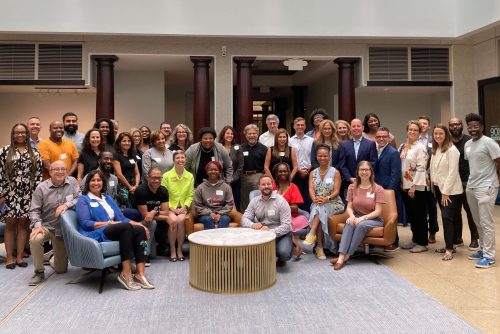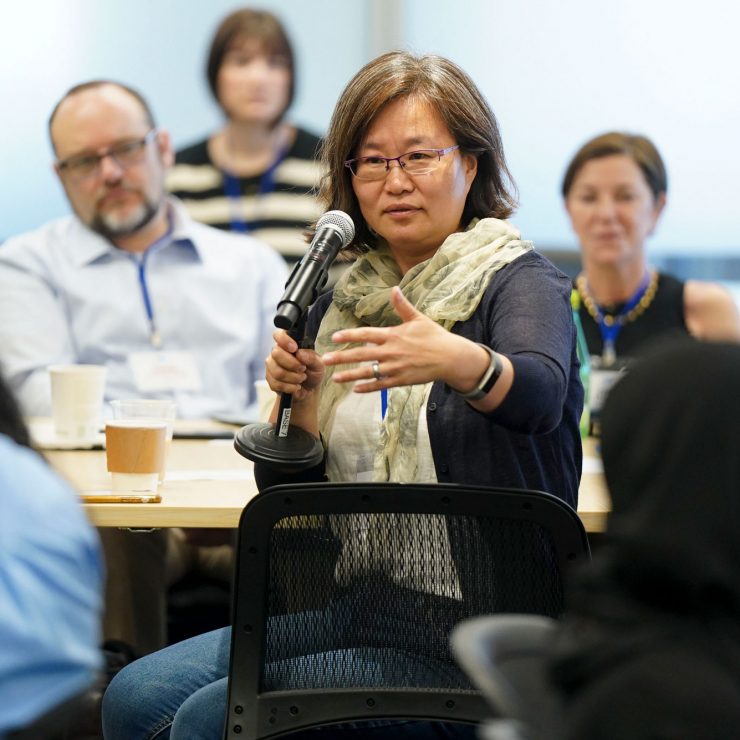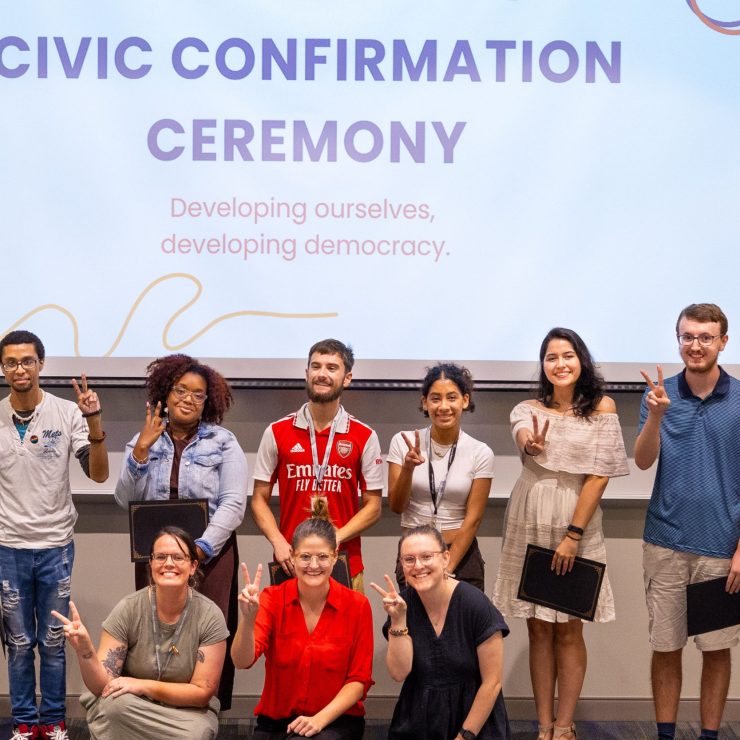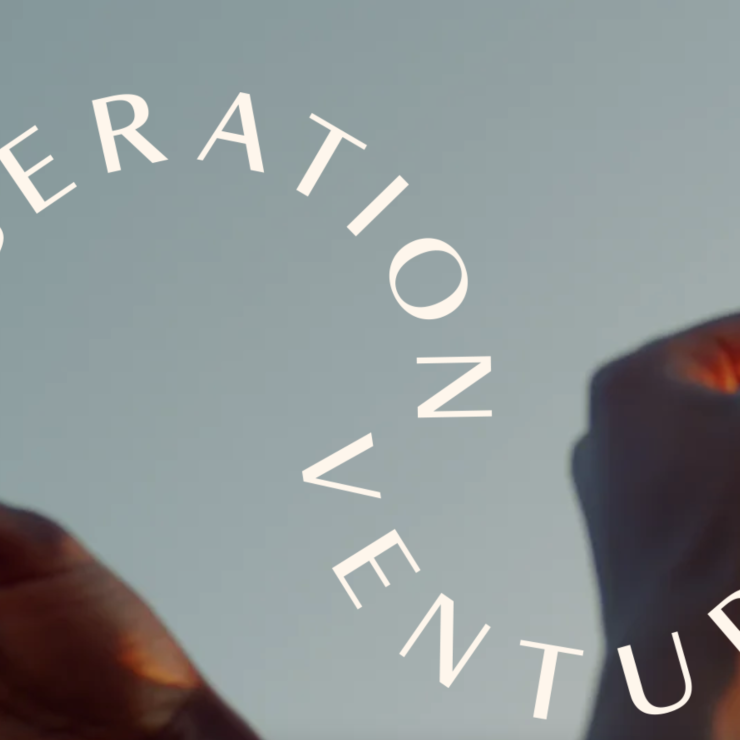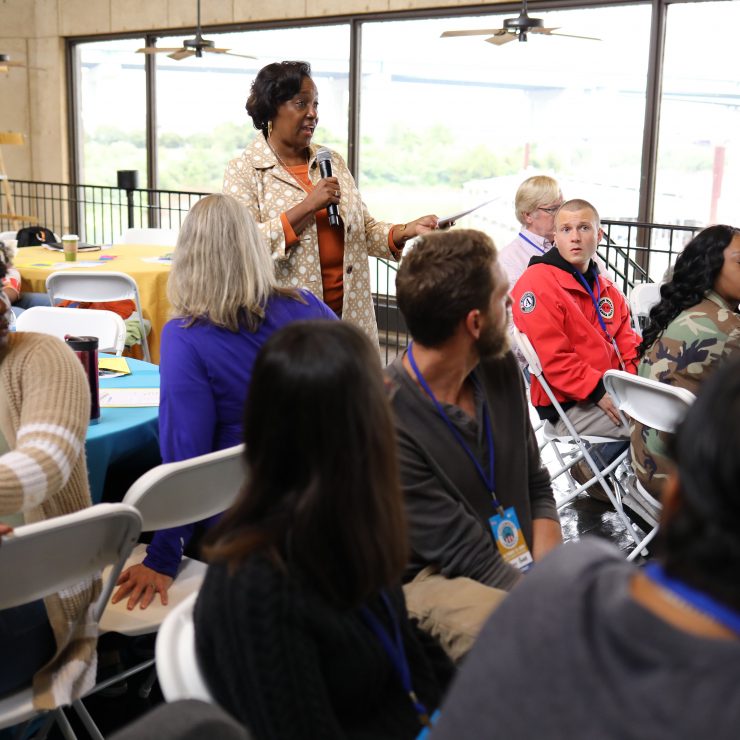Two facts changed the trajectory of Blake Stoner’s career. First, he learned that the most diverse square mile in the US — with 17,000 refugees who speak more than 60 languages — sits a few miles from his home in Atlanta. And second, the state of Georgia ranks dead last for healthcare access and outcomes.
This lack of good healthcare can be devastating for families, especially those that have just arrived to our country seeking safety and care. Blake felt a deep responsibility for his neighbors’ wellbeing, in part because carrying on Atlanta’s civic legacy is literally in his DNA. “My grandfather was one of the Freedom Riders in the civil rights movement,” he shared. “And my parents work in public office and community service. We always are looking to carry on that torch one way or another.”
The way Blake carries that on is by using grassroots-powered storytelling in communities to better represent critical issues they’re facing, like the need for improved healthcare access. And after spending time in Ferguson, MO a few years ago, he noticed several gaps in media coverage, leaving so many without a voice because of the lack of civic reporting infrastructure to properly cover stories that don’t make it to the mainstream. In Georgia, this trend minimized the experiences of many community members who were trying to care for themselves and their families. So he started The Vngle Grassroots News Agency, “a hyper-local news organization to help other newsrooms and civic institutions expand how they cover and source information from overlooked and underrepresented communities.” But he’s just one person with a small-but-mighty team and struggled to find support and opportunities to expand Vngle’s mission.
Then one day a door opened. Or more accurately, 26 doors opened all at once.
He presented his budding project on expanding healthcare media coverage to the ATL Civic Collaboratory. This is a group of other civic leaders and innovators who join together with the simple but profound purpose of helping one another. Convening quarterly, they spend each gathering in a way that is refreshingly countercultural. Instead of just networking, they build deep friendships over meals. Instead of just workshops, they open their hearts and share the emotional load that comes with this kind of work. And instead of offering feedback on one another’s initiatives, they offer firm commitments of help.
When Blake pitched his project, over two dozen people raised their hands to make commitments, offering connections that led to new community partnerships, interns, and a grant to propel his coverage. “I’ve been working on things for many years and the support has been sparse,” Blake shared. “The ATL Civic Collaboratory gave me the biggest single push in one day.”
The ATL Civic Collaboratory gave me the biggest single push in one day.
These kinds of doors don’t open by chance. This model of gathering is a carefully crafted approach that prioritizes building bonds of trust and affection, which lead to generous mutuality. The Civic Collaboratory model, developed by Citizen University and adopted by local organizations in Atlanta, is designed to address the disconnection, silos, and feelings of resource scarcity and competition that often plague the landscape of community organizations. It’s designed to incubate collaborations and make it more possible for today’s crucial civic innovations to grow. “You’re bringing leaders from all walks of life together to help nurture projects and give much-needed support to the people who need it and deserve it, but probably wouldn’t get it,” Blake reflected.
Learn more about the Civic Collaboratory model →
This is made possible by cross-sector, cross-ideological, and reciprocal relationships. They’re bound together by trust, affection, and shared purpose. By design, Civic Collaboratories bring catalysts together across sectors and ideology, modeling the pluralistic way our democracy functions. For Atlanta, this looks like CEOs sitting next to comedians. “I truly believe in creatives being in spaces where people don’t believe that they should be,” shared Collab member and comic David Perdue. “Oftentimes we’re able to see things that not everybody else can see. There’s a certain imagination comedians have that often gets pushed to the side.” But he’s not pushed to the side here at the ATL Civic Collab.
David and his good friend Munir Meghjani pitched their project, Comedy and Conversations, to the group. Their comedy shows inspire curiosity by having tough conversations with a twist of humor and help residents connect with local politicians in unifying, disarming, and joyful ways. They’re tackling the hard stuff, from suicide prevention to immigration. Their shows rely on partnerships with community groups, elected leaders, and local organizations. “Instead of having to connect with 40 or 50 different people, which would have taken us probably five years to do,” shared Munir, “we were able to do that in less than 20 minutes. It was just so much more efficient, effective, and impactful for us.” One commitment, for example, led to a partnership with the Atlanta History Center to host a conversation series on “reconstructing Reconstruction.”
The group’s commitments of support for David and Munir were significant, but it’s the relationships that carry extra meaning for them. “There was a great moment of community coming together around you,” Munir shared, “and also a validation that what you were doing is on the right track.”
We don’t come at feedback from a place of, ‘here are all the holes in your project,’ but more, ‘here’s where we can provide support.’ It helps us come at it from a place of possibility.
Saba Long has also experienced this feeling. She pitched her “Atlanta POV” project with Atlanta Civic Circle that helps residents understand who holds power over what’s happening in their backyards. Saba felt deeply validated after her presentation. “We don’t come at feedback from a place of, ‘here are all the holes in your project,’ but more, ‘here’s where we can provide support.’ It helps us come at it from a place of possibility.” The commitments that she received made that possibility real. As a life-long civic catalyst, she’s helping residents rebuild trust with their elected officials and their neighbors. She’s helping them know what to do when they need a stop sign to slow traffic down and keep kids safe.
This is the kind of culture that these hardworking Atlantans are building. A culture of strengthening trust through relationships, of mutuality and power-sharing. A culture of showing up for one another: practically, emotionally, and physically, like how members of the Collab attend David and Munir’s comedy shows. They’ve got a group chat that keeps them all connected. “The impact isn’t just the proposals or presentations,” Blake shared. “It’s everyday needs.” The culture nurtured within the ATL Civic Collab ripples out not only into their work — but into the ways they work. This way of being together is part of the next chapter of Atlanta’s civic legacy: one of care, connection, and commitment.
